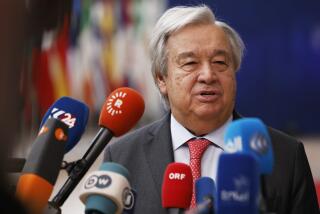European nations criticize Israel over E-1 settlement plan
JERUSALEM — Israel is facing an onslaught of criticism from European allies over its decision to revive a controversial West Bank settlement project known as E-1, which critics say could destroy efforts to create a Palestinian state.
The governments of Britain, France, Spain, Sweden and Denmark called their Israeli ambassadors in for meetings Monday to formally complain about the project, located on the outskirts of Jerusalem.
White House spokesman Jay Carney said the U.S., which has opposed the project for nearly 20 years, is urging “Israeli leaders to reconsider these actions.”
Most of the world’s countries view Israel’s settlement construction on land it seized during the 1967 Middle East War as a violation of international law, and the U.S. and European governments have frequently issued public condemnations over new Jewish settlements in the past.
But the E-1 project is generating the harshest international response Israel has witnessed in years. The settlement is seen as particularly sensitive because it would virtually cut off access between the West Bank and Arab-dominated neighborhoods of East Jerusalem, which Palestinians hope to make the capital of their state.
During a news conference Monday, French President Francois Hollande called on Israel to cancel plans to resume preliminary planning for E-1, warning that a failure to do so could trigger punitive steps.
Asked if France would consider sanctions, Hollande told reporters: “We don’t want to shift into sanctions mode. We are more focused on persuading. It’s an important moment, but I appeal for responsibility.”
Britain’s Foreign Office said: “We deplore the recent Israeli government decision to build 3,000 new housing units and unfreeze development in the E-1 block. This threatens the viability of the two-state solution.”
Israeli news media said that diplomats in London and Paris were considering recalling their ambassadors from Tel Aviv to protest the move, but Israeli government officials dismissed such reports, saying they doubted such drastic steps would be taken.
Yet Israeli officials acknowledged that they could not recall a time when European governments had reacted so sternly to an Israeli settlement plan. “They are very angry,” said one government official not authorized to speak publicly. “I think we could get the cold shoulder from them the next time we need them to vote with us on something.”
Israel’s announcement came in response to last week’s U.N. General Assembly vote upgrading the status of the Palestinian territories in the international body to nonmember observer state.
Israeli officials defended punitive measures, which also include withholding more than $100 million in tax revenue to the Palestinian Authority. They blamed the Palestinians for violating previous agreements by turning to the U.N. rather than returning to peace talks.
“Israel will remain adamant in its vital interests even in the face of international pressure and there will be no change in its decision,” according to a statement from Prime Minister Benjamin Netanyahu’s office Monday. “The one-sided Palestinian approach at the U.N. is a flagrant and fundamental violation of agreements vouched for by the international community. It’s no wonder that Israel did not sit by in silence in light of the Palestinian unilateral measures.”
Several European nations, including France, voted in favor of the Palestinian resolution, while others, including Britain, abstained. The Czech Republic was the only European nation to join Israel, the U.S. and six others in voting against the measure.
More to Read
Start your day right
Sign up for Essential California for news, features and recommendations from the L.A. Times and beyond in your inbox six days a week.
You may occasionally receive promotional content from the Los Angeles Times.





